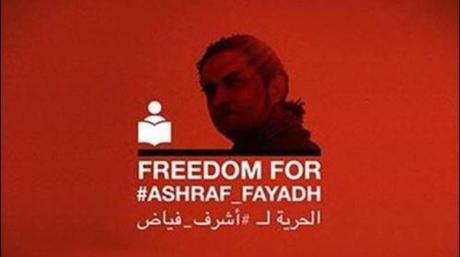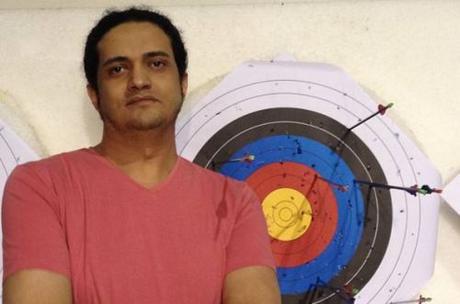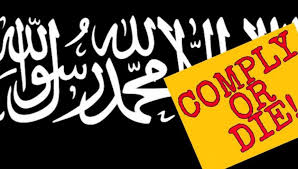Wonder if Hillary believes that “human rights” are to be applied to those with different religious beliefs as well? No worries, more donations should keep her quiet on this matter.

The Guardian reported yesterday that Ashraf Fayadh (35), a Palestinian poet and leading member of Saudi Arabia’s nascent contemporary art scene, has been sentenced to death for renouncing Islam.
A Saudi court ordered the execution of Fayadh, who has curated art shows in Jeddah and at the Venice Biennale. The poet, who said he did not have legal representation, was given 30 days to appeal against the ruling.
Fayadh is a key member of the British-Saudi art organisation Edge of Arabia. He was originally sentenced to four years in prison and 800 lashes by the general court in Abha, a city in the south-west of the ultraconservative kingdom, in May 2014. After his appeal was dismissed he was retried last month and a new panel of judges ruled that his repentance did not prevent his execution.
If you are aware of human rights (such as they are) in Saudi Arabia, this should come as no surprise. Systematic discrimination against women and religious minorities is prevalent. “I was really shocked but it was expected, though I didn’t do anything that deserves death,” Fayadh told the Guardian.

Ashraf Fayadh/Photo from his Instagram account
A migrant rights activist from Kuwait, Mona Kareem, has led a campaign for the poet’s release, said: “For one and a half years they promised him an appeal and kept intimidating him that there’s new evidence. He was unable to assign a lawyer because his ID was confiscated when he was arrested [in January 2014]. Then they said you must have a retrial and we’ll change the prosecutor and the judges. The new judge didn’t even talk to him, he just made the verdict.”
Fayadh’s supporters believe he is being punished by hardliners for posting a video online showing the religious police (mutaween) in Abha lashing a man in public. “Some Saudis think this was revenge by the morality police,” said Kareem. He also believes that Fayadh has been targeted because he is a Palestinian refugee, even though he was born in Saudi Arabia.
Fayadh was first detained in August 2013 after receiving a complaint that he was cursing against Allah and the prophet Muhammad, insulting Saudi Arabia and distributing a book of his poems that promoted atheism. Fayadh said the complaint arose from a personal dispute with another artist during a discussion about contemporary art in a cafe in Abha.
After one day in jail, he was released on bail but the police arrested him again on January 1, 2014, confiscating his ID and detaining him at a police station until he was transferred to the local prison 27 days later. According to Fayadh’s friends, when the police failed to prove that his poetry was atheist propaganda, they began berating him for smoking and having long hair.
You are not allowed to practice or preach a different religion in Saudi Arabia other than Islam. Hence Fayadh is in the position he is in now. “They accused me [of] atheism and spreading some destructive thoughts into society,” said Fayadh. He added that the book, Instructions Within, published in 2008, was “just about me being [a] Palestinian refugee … about cultural and philosophical issues. But the religious extremists explained it as destructive ideas against God.”
During Fayadh’s trial in February 2014, complainant and two members of the religious police told the court that Fayadh had publicly blasphemed, promoted atheism to young people and conducted illicit relationships with women and stored some of their photographs on his mobile phone. He denied the accusations of blasphemy and told the court he was a faithful Muslim. According to the court documents, he said: “I am repentant to God most high and am innocent of what appeared in my book mentioned in this case.”
The case highlights the tensions between hardline religious conservatives and the small but growing number of artists and activists who are tentatively pushing the boundaries of freedom of speech in Saudi Arabia, where cinema is banned and there are no art schools.
Saudi Arabia has a complete intolerance of anyone who does not share government-mandated religious, political and social views. But that is not unexpected from those who adhere to Sharia Law.

DCG

